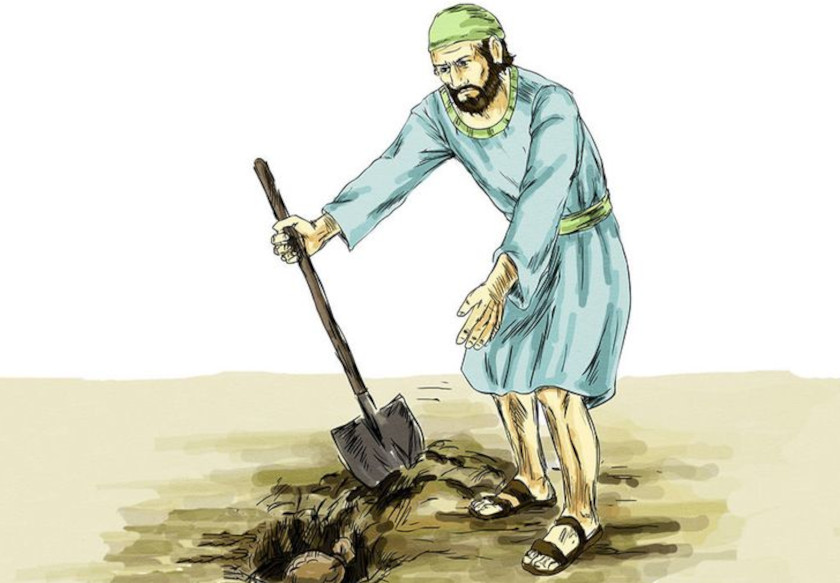“The third servant came to him saying, ‘Lord here is your pound. I wrapped it up in a piece of cloth, for I was afraid of you…'”
Luke 19:11-27
In John 17, Luke marks the purposeful, committed direction that Jesus took toward Jerusalem. He knew what was going to happen to him, yet he, in the words of Luke 9:51, “turned his face toward Jerusalem.” Therefore, there is a veil that lays over much of what Luke records thereafter.
In today’s text, Jesus told a parable “because the disciples supposed that the kingdom of God was to appear immediately,” Luke 19:11. The parable was about a nobleman who was going to a distant country to get royal power for himself, and he entrusts his wealth to his servants. To each of ten servants he gave a single talent. (A talent was a huge amount of money, not “ability” as we understand it. It would take around twenty years labor to raise that much money.)
The nobleman in the parable is Jesus, and the far away country refers to his return to the kingdom of Heaven. So the talents that he entrusts to his 10 servants referred to what Jesus was entrusting to his own disciples after he was gone. Therefore, the amount of the stewardship is not the focus of the parable; each of the servants was given the same amount of responsibility. What does matter in this parable seems to be what the servants did with the stewardship they were given.
The turning point of the parable is when the nobleman returns, he wants to know what the servants did with his wealth. It wasn’t a profit and loss discussion. It was about “what did you do with it?” So the first servant came to the nobleman and said, “your talent made ten more talents.” In other words, he invested or worked with what was given him, and the nobleman was pleased with his effort.
The second servant said, “your talent has made five talents.” The nobleman was equally pleased with the stewardship of the servant. In no place does the nobleman say anything like “I am extremely pleased with the growth of my money.”
A third servant, the point of the parable, comes to the nobleman and says, “I was afraid of disappointing you because you are a harsh man. So I buried your talent to keep it safe until you returned. Here’s your talent safe and sound.” This enrages the nobleman. “Why didn’t you, at least, put the money in the bank where it could gain some interest?”
If you zoom out to find what Jesus is saying to his disciples, it would appear that he is saying that what he wants from us a willingness to commit our lives to the mission of the Kingdom of God with an attendant willingness to take risks for the kingdom. Likewise, Jesus has no respect for indolence, indifference, cowardice, or small vision when it comes to the kingdom and his mission.
Something to think about: Matthew tells a similar story, only his story has three servants who get, respectively, five, three, and one talent to invest. Luke makes it easier to see that the amount is unimportant to Jesus’ point. Jesus told the parable to emphasize courage and risk with respect to the kingdom. What are you “investing” of yourself for the sake of the kingdom?
Something to pray about: Jesus, you gave your life in order to redeem us from the power of this evil world. You have called us into your mission and have left us to invest ourselves in that work. May we not be like the servant who was afraid and unwilling to take risks and only buried his talent. Please help us to be courageous and bold for you. In Jesus’ name. Amen.

